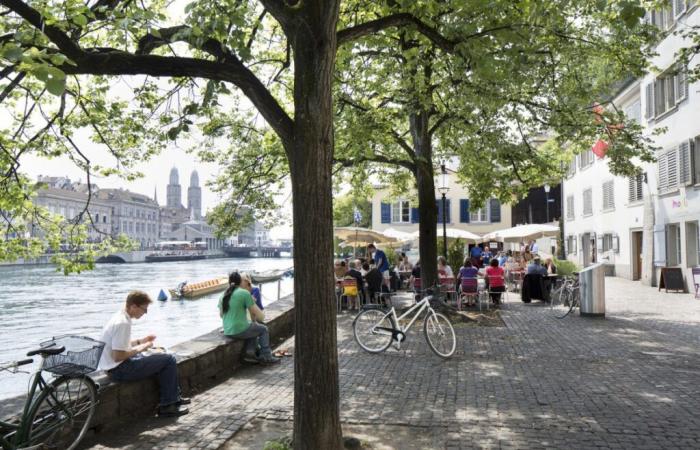Keystone / Gaetan Bally
Whether it is quality of life, universities or globalization, Switzerland regularly excels in international rankings. swissinfo.ch analyzes the results of recent global surveys.
This content was published on
08 November 2024 – 10.30am
Switzerland has one of the most livable cities in the world, Zurich, according to a recent study published in Nature CitiesExternal link. In the country’s largest city (430,000 inhabitants), 99.2% of residents live within a 15-minute walk of essential services such as healthcare and education. The 15-minute city – WikipediaExternal link» is a concept used by scientists and urban planners. Sprawling North American cities that rely heavily on cars, such as Dallas, Atlanta and Detroit, ranked poorly.
“For me, coming from the United States, Zurich is a very walkable city,” Luke Harris, a landscape architect from Portland, Oregon, told The Guardian newspaper. “Most of the things you need are within walking distance, and if not, it’s easy to take public transportation,” he explains.
Every working day, one of our journalists personally compiles the most important news from Switzerland for you. To subscribe, it’s over here.
Zurich regularly features in global rankings and is a popular destination for foreign workers. In the 2023 surveyExternal link on the quality of life of expatriates conducted by Mercer, Zurich ranked second behind Vienna and ahead of Auckland. Zurich has been praised for its political stability and quality infrastructure. Geneva took fifth place.
Despite recent challenges such as the Covid-19 pandemic, Switzerland, with its population of nine million, retained first place for a second consecutive year in the United Nations Human Development Index (HDI), which focuses on global living standards. The Swiss rating was boosted by high incomes ($69,433 gross national income per person) and long life expectancy (85.9 years for women, 82.5 years for men in 2022).
High salaries but…
Switzerland is certainly one of the richest countries in the world. According to the UBS Global Wealth Report, the average wealth of a Swiss adult (debts excluded) amounts to $709,612 (638,012 francs), ahead of Luxembourg ($607,524) and Hong Kong (582 000 $).
Salaries are high, but the cost of living is also high. Cities like Zurich, Geneva, Basel and Bern are among the most expensive in the world; Switzerland tops The Economist magazine’s Big Mac Index, which measures the cost of a Big Mac hamburger in different countries and shows the difference in purchasing power parity between them. If we take into account taxes and pension contributions, rent (on average 1,412 francs per apartment in 2022), public transport and the increase in health insurance premiums (360 francs per month), these Impressive salaries are starting to lose their appeal.
Plus
Plus
Swiss salaries: high, stable, but often insufficient
This content was published on
22 mar. 2024
Although among the highest in the world, Swiss salaries are not always sufficient.
read more Swiss salaries: high, stable, but often insufficient
The Swiss are living longer, partly thanks to the country’s healthcare system. In 2022, Switzerland was ranked first in a world rankingExternal link access and quality of health systems. But this is expensive: 11.3% of gross domestic product (GDP) in 2022, an average higher than that of 8.8% for the countries of the Organization for Economic Co-operation and Development (OECD). The aging of the population and medical-technical progress are driving up costs.
Bons and maths
The United Nations Human Development IndexExternal link also takes education into account. Switzerland also obtained a good mark in the latest ranking with the second highest average years of schooling (13.9 years for people aged 25 and over), tied with Canada, but just behind Germany (14.3).
The latest OECD PISA survey, published in 2023, revealed that Swiss 15-year-olds scored 508 points on the PISA scale in 2022, compared to 472 points on average. Six countries performed better, all in East Asia. Swiss 15-year-olds obtained good results in mathematics. They are also above average in science and reading, but a quarter of Swiss students have not reached the minimum level in reading.
Swiss universities like the Swiss Federal Institute of Technology Zurich also do well in global surveys. Switzerland has the highest concentration of top-level study programs in the world, according to British higher education firm Quacquarelli Symonds (QS).
The reputation of Swiss universities for their excellence, international environment and relatively low tuition fees attracts large numbers of foreign graduates. They now represent around a third of all registrations. The percentage of foreign graduates in Switzerland is higher than in other OECD member countries. Some establishments are therefore considering capping numbers and increasing tuition fees.
A global player
The healthy business climate in Switzerland regularly receives good marks. It won the top spot in U.S. News & World Report’s annual Best Countries rankings.External link published in September, and received high marks in categories such as openness for business, quality of life and entrepreneurship. “The country’s strong economy is fueled by low corporate tax rates, a highly developed services sector led by financial services, and a high-tech manufacturing industry,” the report said.External link.
Thanks to the dynamism of its trade, the stability of its currency, its financial center and the presence of numerous international organizations, the country is once again ranked among the most globalized countries. It is also considered one of the most competitive and innovativeExternal link. The general business environment, use of new technologies, patents and technical know-how have allowed it to top the annual ranking of the UN World Intellectual Property Organization (WIPO) for 13 consecutive years.
Expensive accommodation and no friends
But, despite a strong economy, a healthy job market and low taxes, Switzerland is less popular than ever with foreign professionals, according to a survey by the expat platform Internations published in June. Switzerland ranks 34th out of 53 countries, compared to 23rd last year. It continued to score points for its quality of life and salary levels, but the lack of affordable accommodation remains a constant headache. Many skilled workers also complain about their social lives and say they struggle to make friends in Switzerland.
Plus

Plus
Between Zurich and the French, it’s serious
This content was published on
Dec 20 2016
Vintage decor, relaxed atmosphere and festive music that mixes with conversations in the language of Molière. Only the waitress speaks German in this small bar in a trendy alternative district of Zurich, located in the heart of the German-speaking part of the country. The thirty or so customers left the tables to gather in front of…
read more Between Zurich and the French, it’s serious
Other weaknesses exist. We must not forget the democracy indexExternal link from the Economist Intelligence Unit, according to which neutral Switzerland fell one place in 2023, ranking 8th behind Norway, New Zealand, Iceland, Sweden, Finland, Denmark and Ireland. Or even press freedom: Switzerland now occupies ninth place in the latest Reporters Without Borders ranking, after reaching twelfth place last year. The Alpine nation also ranks sixth in Transparency International’s 2023 Public Sector Corruption Perceptions Index (CPI). Gaps are particularly evident in combating money laundering, private sector corruption, prosecuting businesses and protecting whistleblowers, Transparency International said.
Swiss climate policy also continues to disappoint. Last December, it stagnated at 20th place in the annual Climate Change Performance Index (CCPI), which assesses the climate protection efforts of 63 countries plus those in the European Union – the largest emitters responsible for 90% of global greenhouse gas emissions.
Proofread and verified by Reto Gysi von Wartburg / translated from German by Françoise Tschanz / kro








